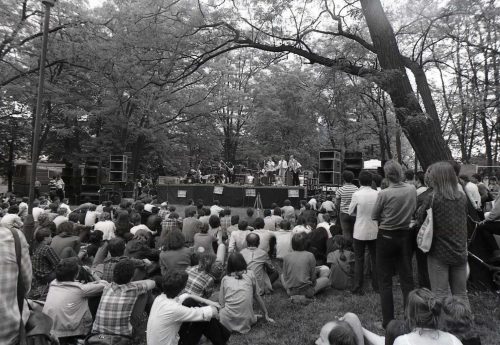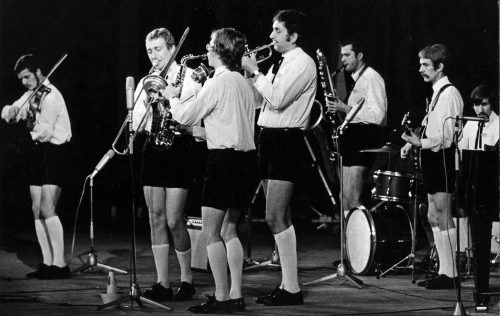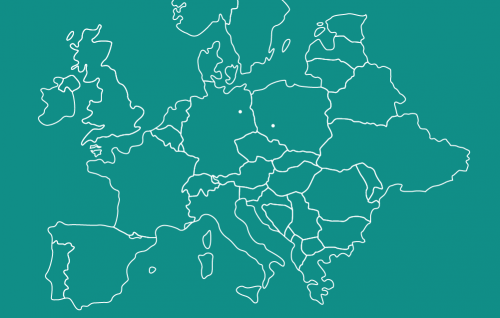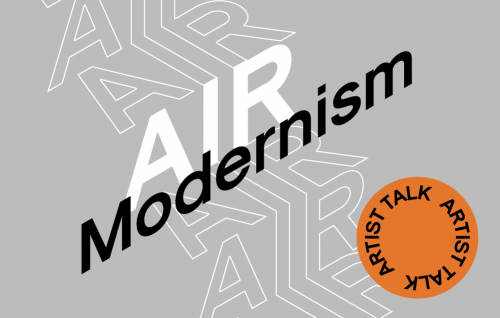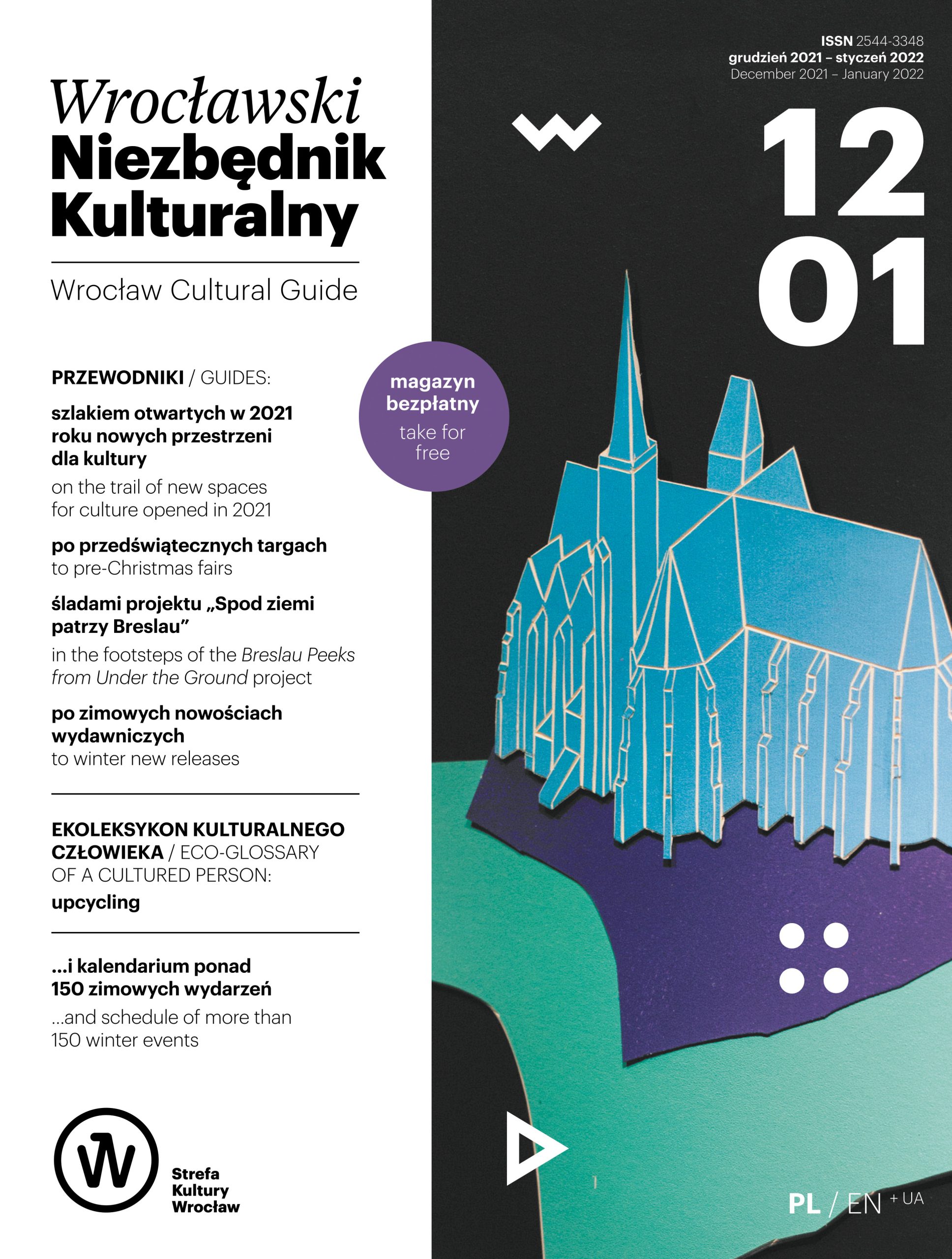4 minutes read
1957. The first National Review of Student Jazz Bands takes place in Wrocław, with the finale in the People’s Hall – now more commonly known as the Centennial Hall. Zbyszek Namysłowski was one of the winners there. Another edition was planned for next year, but since the student activists moved the review to Cracow, it was never actually organised again. This was the last such defeat in the history of Jazz on the Odra Festival, which wasn’t even called such at that point. Too bad, we lacked determination.
Then, we had the breakthrough year – 1964. The review/festival/competition was officially named Jazz on the Odra and started taking place on a regular basis. The event was pretty much propped up by Karol Maskos and other jazz aficionados, who came up with the idea to organise a competition for young jazz pianists from Lower Silesia, accompanied by a jazz graphics exhibition. Although some people made attempts to steal the festival and move it to the Warta, to the Baltic Sea or to Łyna, as Olsztyn was planning to do, we didn’t let anybody take it away,
The year 1968 was another important date in the student community. We started in March, as usual. It was Friday, the 8th of March. Warsaw was already engulfed in protests, students were beaten, there were demonstrations under Mickiewicz’s monument, but the news from the capital were few and far in between. Years have passed and I somewhat believe that it was perhaps the Jazz on the Odra Festival, which made the student protests in March start on Monday, after the festival. If the festival were to start a week later, it would probably never start again. That time we were lucky.
1974. Two days before the festival, I was “politely invited” to the offices on Łąkowa Street, which served as headquarters of the Civil Militia and other secret services. They asked me why I decided to invite Salon Niezależnych (Jacek Kleyf, Michał Tarkowski and Janusz Weiss) to a jazz festival. They were dissidents! I made a silly face and started talking some crap about how jazz has nothing to do with politics, but even despite that, I was presented with a helpful offer – they claimed they could support me with cancelling the festival. “We can do that with a single stroke of a pen,” they said. I decided not to take them up on that offer, and the Happy Jazz concert at the People’s Hall, starring Salon and Asocjacja Hagaw was a great hit.
Finally, martial law. 1982. All festivals were cancelled. The students organising the Jazz on the Odra Festival got the permit for it only ten days before the planned date. In line with the military directive, the performers were divided into three companies, four bands each, which performed on each day in one of three – now defunct – clubs: Pałacyk, Rura and Indeks. For the only time in the history of the festival, the final concert on 30th May literally took place on the Odra – on the Malt Island. The event ended at 10:00 p.m., although not all performers managed to play – a militia captain, who was overseeing the festival disconnected the cable, which powered the stage, emulating the security bureau officer from Wajda’s Man of Marble.
1988. The Polish Students’ Association, which organised the festival to date, was slowly collapsing, preoccupied with politics, rather than culture. It was the first year ever without Jazz on the Odra, even though we were just about to celebrate our silver anniversary. Fortunately, the charismatic editor Zdzisław Smektała took up the mantle in 1989 and mobilised everyone – the PSA, the Polish Jazz Association, fans and – surprisingly enough – the First Secretary of the Regional Committee of the Polish United Workers’ Party, who led the Honorary Committee. Comrade Balicki had no clue about jazz, and we managed to convince him that it wasn’t the music of rotten capitalism, but the cry for freedom of the oppressed black proletariat in the States. He bought it. We got lucky again.
Unfortunately, as is often the case, after a lavish anniversary, everything fell on its face and on the next year, we faced the same problem, nobody picked the festival up. But every dark cloud has a silver lining, and we found another good spirit – this time around, it was Remigiusz Lenczyk from the Voivodeship Office, the same one, who previously managed to find a place for the legendary Rura club. He told me and Maciek Partyka one thing: “The Jazz on the Odra Festival is going to happen and you’re going to make it happen.” And that’s exactly what happened. A foundation was established, which saved the festival from oblivion. And it all worked fine until 2001.
Everybody knows that when things go well, people often come out of the woodwork to claim their rights to the success. The activists of the Polish Jazz Association in Wrocław decided that they held the rights to the festival, and since they had their people in the city council, they took over the festival grant and organised another one, which they called “the first international festival” – as if Jazz on the Odra was some local event, despite numerous world-famous jazz stars in its line-ups to date. And thus, thanks to the jazz “friends”, the festival was close to disappearing from the cultural map of Wrocław. Thankfully, Mayor Rafał Dutkiewicz bought the rights to the festival from the foundation for a symbolic 1 PLN and since 2004, Jazz on the Odra has been organised under the auspices of the City of Wrocław. The late Jan Mazur made some calculations, adding together the 36 editions of the Jazz on the Odra and 3 Wrocław Jazz Festivals, and he somehow came up with 40. That’s how our festival caught up with its own anniversaries and for years, it has been recognised as the best Polish jazz festival.
I was there in the Pałacyk during the first edition of the Jazz on the Odra in 1964. I never missed a single edition. But the 55 editions to date is definitely not enough. I want to celebrate the 56th festival together with everyone in October. If the communists didn’t manage to shut us down, the virus doesn’t stand a chance.
Wojtek Siwek
The photographs come from the monograph published on 50 years of Jazz on the Oder by W. Siwek and B. Klimsy

